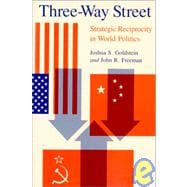
| List of Figures and Tables | |
| Acknowledgments | |
| Introduction: An Outline and Rationale | |
| Theories of Cooperation Game-Theoretic Approaches Prisoner's Dilemma Games and the Tit-for-Tat Strategy Applications to International Relations Evaluation of Game-Theoretic Approaches Psychological Approaches Psychological Theory and GRIT Images and Expectations in International Relations Evaluation of Psychological Approaches Quantitative-Empirical Approaches Richardson's Model and Negative Grievances Quasi-Experimental Studies of International Politics Evaluation of Quantitative-Empirical Approaches Elements of Strategy Cooperation and Reciprocity Policy Inertia Triangular Strategy Toward a Better Understanding of Great Power Strategies | |
| Sino-Soviet-American Relations, 1948-87 Measuring Cooperation and Hostility The Three Events Data Sets Criticisms of Events Data A Quantitative History of Relations U.S.-Soviet Relations U.S.-Chinese Relations Soviet-Chinese Relations Long-Term Trends in Sino-Soviet-American Relations | |
| The Reality of Reciprocity Modeling Strategic Behavior Vector Autoregression Overview of the Data Analysis Results of Specification Analyses Patterns of Strategic Response Bilateral Responses Triangular Responses Policy Inertia Conclusion | |
| Six Cooperative Initiatives Zhou's Bandung Initiative (April 1955) The Initiative The Course of Events Zhou's Trip to Eastern Europe (January 1957) The Initiative The Course of Events Johnson's Gestures of Goodwill (October 1966) The Initiative The Course of Events Nixon in China (February 1972) The Initiative The Course of Events Gorbachev's Testing Moratorium (July 1985) The Initiative The Course of Events Gorbachev's Vladivostok Speech (July 1986) The Initiative The Course of Events Some Lessons | |
| Evaluating Cooperative Strategies Testing Alternative Strategies Results Theories of Cooperation Revisited Game-Theoretic Studies of Cooperation Psychological Studies of Cooperation Toward a Unified Theory of Cooperation | |
| Toward Lasting Cooperation The Late 1980s Is Cooperation Evolving? The Next Step A Limited Reciprocity Regime Soviet "New Thinking" Toward Three-Way Cooperation | |
| Data Listing | |
| Technical Results | |
| Notes | |
| References | |
| Index | |
| Table of Contents provided by Publisher. All Rights Reserved. |
The New copy of this book will include any supplemental materials advertised. Please check the title of the book to determine if it should include any access cards, study guides, lab manuals, CDs, etc.
The Used, Rental and eBook copies of this book are not guaranteed to include any supplemental materials. Typically, only the book itself is included. This is true even if the title states it includes any access cards, study guides, lab manuals, CDs, etc.